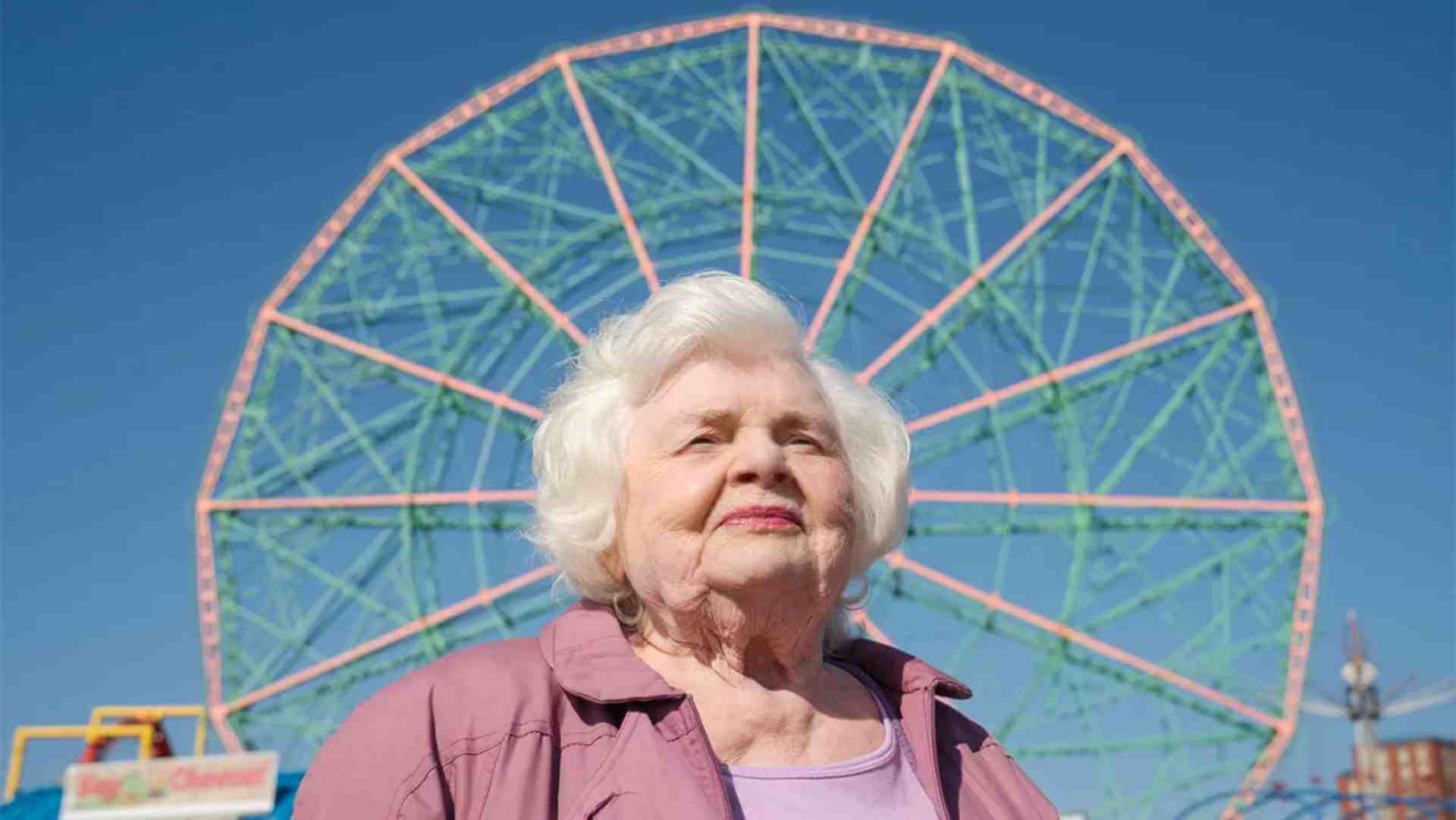To know Eleanor Morgenstein is to love her—apparently. As played by June Squibb, the title character of Scarlett Johansson’s feature directorial debut is a bitingly sarcastic, tell-it-like-it-is nonagenarian who, in the midst of profound grief, makes an unconscionable decision. Much of Eleanor The Great chronicles the aftermath of that decision, watching as a lie she tells snowballs out of control. This tonally tricky comedy-drama tackles aging, loss, the Holocaust, Jewishness, and the difficulty of determining the truth in a fake-news world. But Johansson’s well-meaning film couldn’t be more aggravating, and its biggest problem is its insistence that we find Eleanor so damn endearing, no matter what.
Eleanor lives in Los Angeles with her best friend Bessie (Rita Zohar), whom she’s known for 70 years. They’ve been roommates since their husbands died more than a decade ago, constantly trading quips and telling off whippersnapper grocery store employees. But, occasionally, Bessie has trouble sleeping, waking up from nightmares that take her back to her childhood in Poland, where she barely survived the concentration camps. At their kitchen table before the sun comes up, Bessie relates her horror stories to Eleanor, who tries to make her friend feel better. But those emotional scars are permanent, and Bessie knows she’ll wear them to the grave.
When Bessie does die, the terribly alone Eleanor flies to New York to move in with one of her adult daughters, divorced mom Lisa (Jessica Hecht), with whom she’s never been close. The tension between them is apparent instantly, the 94-year-old criticizing Lisa’s apartment and life choices. She’s especially unhappy once Lisa gently suggests checking out assisted-living facilities—and signs her up for Jewish Community Center events to keep her busy. Reluctantly attending one such event, Eleanor gets distracted by a separate meeting being held down the hall, only belatedly realizing she’s accidentally joined a support group for Holocaust survivors. Rather than admit her mistake, though, Eleanor feels so welcomed by the group that she starts sharing her memories of the camps—except they’re not her memories, they’re Bessie’s. She hasn’t felt so included, so valued, since Bessie’s passing, so she keeps up the charade. Who could it possibly hurt?
Tory Kamen’s screenplay quickly provides the answer: A sweet NYU journalism student, Nina (Erin Kellyman), attends the meeting for an article she’s writing, moved by Eleanor’s harrowing tale. With her daughter and grandson (Will Price) wrapped up in their own lives, Eleanor doesn’t have much human contact, so she lets Nina interview her, befriending this college student in the process. Turns out, Nina is going through her own grief: Her artist mother died only a few months ago. Unfortunately, the longer Nina spends with Eleanor, the more Eleanor draws on Bessie’s stories, essentially creating an alternate identity based on her late friend. (Nina knows Eleanor’s friend died, but not that Bessie lived the life Eleanor is pretending is her own.) Adding more complications, Nina’s father Roger (Chiwetel Ejiofor), the charming host of a local TV news segment focusing on unique New Yorkers, becomes interested in doing a broadcast on Eleanor’s remarkable (and wholly fabricated) past.
Squibb, who turns 96 in November, has enjoyed a prolific career later in life, receiving an Oscar nomination for 2013’s Nebraska and landing her first starring role in last year’s action-comedy Thelma. Her characters are surly, mischievous wiseasses, and Eleanor The Great capitalizes on that onscreen persona, giving us a woman who, early in the film, doesn’t mind telling the occasional white lie to ensure that Bessie gets special treatment in the hospital. But once Eleanor starts stealing from Bessie’s experiences, the deceit becomes troubling. Lying about being a Holocaust survivor is a serious ethical lapse, and one that will surely bring consequences. But for the most part, Eleanor doesn’t display any sense of guilt or concern—she’s just so grateful to have a new friend. Is Eleanor The Great the melancholy story of a grief-stricken woman? Or is there something more devious (or demented) in Eleanor’s flouting of the truth?
A sharper movie would have explored those intriguing questions. But Johansson is after something far tidier and syrupy. Her manipulative film introduces an inherently nervy premise but then quickly and unconvincingly pivots away from its more serious implications. Squibb plays Eleanor with blandly crotchety adorableness, her incurious movie ignoring any potentially compelling inner conflict. Eleanor The Great‘s moral complications are insultingly sanded off in the name of treacly messages about forgiveness and grief.
At a moment when many Jews have anguished feelings about both Israel’s ongoing pummeling of Gaza and the Trump administration’s exploiting of antisemitism to target universities, Eleanor The Great means to illustrate the struggles and the beauty of modern Judaism and the Holocaust’s ugly lingering shadow. (Belatedly, Eleanor wants to finally have her bat mitzvah, inspiring an on-the-nose scene in which a rabbi discusses the Torah’s teachings about lying.) But like another falsely feel-good film about bigotry—Jojo Rabbit, which earned Johansson an Oscar nomination—Eleanor The Great seeks uplift not insight. It wants to put a happy, tearjerking face on the trauma it’s intending to memorialize. We’re expected to sympathize with Eleanor because she’s a lovable, lonely stinker who made an innocent mistake that got out of hand. But it’s hard to forgive her when Eleanor never wants us to doubt how great she really is. Grief can make people do unimaginable things—too bad Johansson’s debut lacks the imagination or courage to delve into the darkness in order to bring her audience (and Eleanor) back into the light.
Director: Scarlett Johansson
Writer: Tory Kamen
Starring: June Squibb, Erin Kellyman, Jessica Hecht, Rita Zohar, Chiwetel Ejiofor
Release Date: September 26, 2025

 Keep scrolling for more great stories.
Keep scrolling for more great stories.
